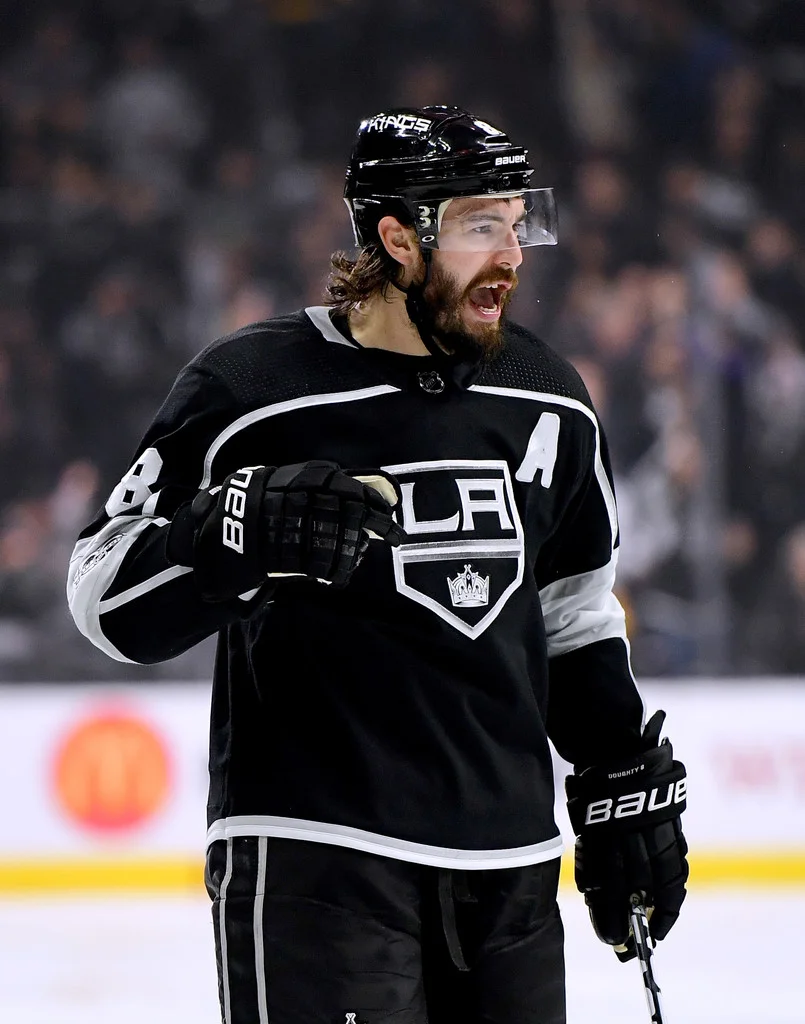March 6, 2018 | 11:36am ET
BY Dennis Bernstein, The Fourth Period
CURB YOUR ENTHUSIASM
LOS ANGELES, CA -- So about that third period last Saturday at Staples Center...
Just when you thought things were going to be put in a tidy little bow and a Los Angeles Kings four-game winning streak would vault them ahead of the San Jose Sharks for second place in the Pacific Division, an inexplicable final 20 minutes fueled by anger and nonchalance took two points off the standings board.
If you suffer from motion sickness, you may want to step off this ride for the final 16 games and climb back on for Game 83 – yes, I still think this team gets to the post-season – because there is no reason to think that the roller coaster ride you’ve been on won’t last for a couple of weeks more.
The latest demonstration of up-and-down hockey is probably the most damning for Los Angeles given the state of the opposition last Saturday – the once-mighty but now downtrodden Chicago Blackhawks. Their win at Staples Center was the exception, not the rule, in their three-game California roadtrip – the bookends blitzes they received at the hands of the Sharks (7-2 with San Jose scoring seven straight goals) and the Ducks (6-3 as Anaheim jumped out to a 4-0 lead) makes their comeback third period win even more confounding from a Kings perspective.
It was no surprise to see Chicago jump out to a 1-0 lead as the home side surrendered the first goal in its seventh-straight game, but in fairness they have played far worse opening 20 minutes this season. It was their second period, a dominant one in which they scored three and could have had a few more, that demonstrated how good this team can be. They controlled the pace with their speed, owned the middle of the ice via the sizable advantage at center and finished at the net, a middle stanza performance that had most in the building adding a +2 in the points column during intermission.
But what transpired in the final 20 minutes is akin to a thoroughbred leading a race comfortably in the deep stretch and having its jockey stand up, allowing the horse to let up and getting passed at the wire for the winning check.
In this case, the jockey is Drew Doughty.
Let’s be clear on one thing, Doughty did have co-conspirators on that afternoon. He was not the one that started the parade to the penalty box; Jake Muzzin was at the head of the procession with a needless holding penalty that did not result in a penalty but did give the Blackhawks an inkling that the contest had not been determined. With the Kings having to defend instead of working to extend their margin, they lost their edge in territorial play and set the stage for the turning point that robbed them of what could be a decisive two points in mid-April.
Yes, it was a marginal call when Doughty was whistled for hooking against Eric Gustafsson eight minutes into the third period of a late-season game. Maybe the referee should have pocketed his whistle given the foul did not rob Chicago of a scoring chance. But at the point where he banished Doughty to the box, if you’re a leader you skate to the box like Anze Kopitar, Dustin Brown or Jeff Carter would, serve the two minutes and return to help your team win the game.
Instead, he pulled a selfish move by delivering an outburst that earned him a second minor which opened the door for four Chicago goals in the space of 9:09. Just 15 seconds into the second minor, Artem Anisimov scored to start the Blackhawks climb back and when Patrick Kane closed the show with an empty net goal, there was still anger in the Kings room, but it had been displaced from Doughty to his boss, coach John Stevens.
The best adjective I could use to describe Stevens’ ending podium talk was ‘seething.’ To be honest, I liked the surliness in his voice as he tried to control his displeasure at the lack of composure of his team in general and specifically, one of its leaders. When your team gifted away two valuable points, in fact you should be channeling your inner John Tortorella.
“Let’s not deny the white elephant in the room here. Total undisciplined play,” Stevens said. “Everything you do in a hockey game should have the best interest of the team.”
The real issue at hand is the lack of leadership shown by one of the most accomplished players in the league. At 28 years of age, Doughty has achieved what most dream of – two Stanley Cup championships and an Olympic Gold Medal. He is not too far from signing the largest contract of his professional career and if I had a game seven to win, he’s my 1D – only Duncan Keith and Brent Seabrook have more rings and they are clearly are no longer at his level. His current contemporaries, Victor Hedman, Erik Karlsson and Roman Josi, don’t have the championship pedigree he possesses.
If this was a one-off situation, you invoke ‘the heat of the battle’ cliché and move on, but it wasn’t. Doughty has drawn three unsportsmanlike penalties this season with the most recent being in Calgary just prior to the All-Star break. After being assessed a hooking penalty, Doughty launched his stick in the air to put his team in a similar four-minute hole in their most important regular-season game in recent memory. His team dodged that bullet and went on to win that game, but this time, the bullet pierced their collective body and the bleeding it initiated could not be stopped.
Doughty knows better and I have no problem with him declining to speak with the media after a 35-minute wait following the loss. The combination of residual anger, embarrassment and disappointment would challenge all of us in that moment, so a deferral was probably wise for everyone.
He gathered his thoughts over what was surely a long weekend and addressed the issue on Monday. To no surprise, Doughty admitted he is his own worst enemy in controlling his anger and is not working with the leadership core to take corrective action.
He shouldn’t. It’s not that hard. And my guess is that the leadership group he is a part of has grown weary of the act as well.
For those who say that’s part of the package when you get Drew Doughty, I don’t buy it. Without question he is among the most competitive players I’ve ever covered, but he’s not unique that sense – Jonathan Toews and Sidney Crosby hate to lose just as much but they understand the nuance of gamesmanship. They have grasped the concept of how to work that bad call into a good one the next time around. They grasp the technique of how to have a pointed conversation with a referee without tipping over 18,000 people that you’re royally pissed at a call and have learned to summon the strength that prevents your emotions from getting the best of you in a big spot.
Like any other on-ice weakness, Doughty needs to work on cultivating a relationship with referees instead of furthering a reputation of showing them up. It’s no different than practicing shot accuracy or undertaking a power skating regimen and he needs to dedicate that inner drive he has to curb his outbursts. Maybe this instance, the one that ultimately cost the other 22 players in the room a victory, will be the tipping point. With four days off until the Kings next game could not come at a better time for him to consider the consequences of his actions.
Moving on from the Doughty Drama, the Kings’ playoff destiny is still in their hands. A precious 16 games remain and only seven are against current playoff qualifiers. Thursday’s game against the Washington Capitals will be the last time they face a first-place team and a 10-6-0 finish gets them to 97 points, a number that while won’t guarantee a return to the playoffs, makes it very likely.
Doable? Yes. The math is easy – 10 home games left, win them all, punch the post-season ticket and earn those first-round season ticket holders’ green. But since the calendar turned to 2018, the Kings are 5-7-0 at home and because of them I’ve christened them with a new nickname:
The Unpredictables.
This team could easily go 5-5-0 at home and 5-1-0 on the road to grab those essential 10 wins and that might not be the worst thing in the world because I will submit to you that the best seed in the West this playoff year isn’t a 1 seed or even having home ice advantage.
It’s the first wild card with a presumption that the Vegas Golden Knights hold on to the Pacific Division.
Cinderella has become a regular-season monster in the desert 250 miles northeast of Los Angeles. A franchise that existed only on paper a year ago is now among the most entertaining teams in the league with a legitimate home ice advantage courtesy of a significant fan base that actually travels!
It’s not the Vegas Flu that does teams in at T-Mobile; it’s a grinding team that feeds off the electricity in the building that wins games.
It’s 23 players who play still play with a collective chip on their shoulders and look like they still want to prove the 30 other GMs wrong.
It’s because they have a goaltender who has a championship pedigree that is one of the requirements in a deep playoff run.
This team is far from a mirage and they have galvanized a growing metropolis that isn’t just limited to the two mile stretch of Las Vegas Boulevard known as the Strip. They shattered all the standing records for expansion teams and are among the betting favorites to win the Stanley Cup. Through this magnificent ride, I feel they were the best sports, not just hockey story of 2017.
But the playoffs start in 2018.
As I watched this team play their home-and-home series against the Kings last week, two things became apparent to me. Despite their speed, intensity and determination, they lack two of the three requirements usually needed to win 16 post-season games – a two-way No.1 center and a No.1 defenseman (granted the Penguins won it all without Kris Letang last June, but Sidney and Geno more than make up for that).
William Karlsson is a revelation; he’ll pot some in the post-season, as will the other members of his line Jonathan Marchessault and Reilly Smith (maybe the best player of the three). They might get help from James Neal and the newly acquired Tomas Tatar, but when you need a stopper in a big spot, there isn’t the 23 minute a night horse in the pivot you need to control the middle of the ice like an Anze Kopitar, Ryan Getzlaf or Mark Schiefele.
Furthermore, it’s an open debate as to who is Vegas’ No.1 defenseman. Nate Schmidt is the time-on-ice leader, but he’s really a strong 3D. Derek Engelland is as close as you can come to a shutdown defenseman on the depth chart and maybe him and the rest of the defense by committee smothers the opposition in a matter of weeks.
But is anyone going to be afraid to face this team with no playoff track record?
The Golden Knights could finish with 110 points and they would still be the team I would want to face in the first round because the certainty of the regular-season evaporates once you get to Game 83. I’m interested to see the reaction if Vegas loses their Game 1 playoff game at home because that would be the most adversity this team has faced all season. By the time the last non-believer left the building this season, Vegas had glided to a comfortable division lead and truth be told, nothing is easier when you play with house money for six months.
But in six weeks, everything is set to zero – it’s a standing start with 16 teams and your next opponent has a book on you through advanced scouting, so by Game 2 there are no surprises and your weaknesses will attempted to be exposed again and again over a two week period of time.
Without proven premier post season talent, I see only one path to a deep Vegas playoff run:
Marc-Andre Fleury.
Without question, he will have to be at his finest because unlike that January game against Arizona, every inch of the ice will be contested by the opposition. Those odd man chances you had in bushels against Buffalo will drop to the single digits and the great teams could care less if someone else’s building is in full throat against them – the champions have a way of tuning out the noise and disrupting the opposition’s flow.
We just don’t know how Vegas will respond out of the box in the post-season so for that reason, that is the team you want to face in the first round.
There will be a defining moment in the first round that will need questions answered and without the benefit of a body of work to rely on, they are the team at the most risk.
Bring them on.
Dennis Bernstein is the Senior Writer for The Fourth Period.
Follow him on Twitter.
Past Columns:
- Feb. 22, 2018 - Eight Days in February
- Feb. 13, 2008 - Don't Blame Rob
- Feb. 06, 2018 - Kings At The Turn
- Jan. 24, 2018 - A Man Without A Letter
- Jan 15, 2018 - Going for the silver
- Jan. 08, 2018 - Sliding into the bye week like...



